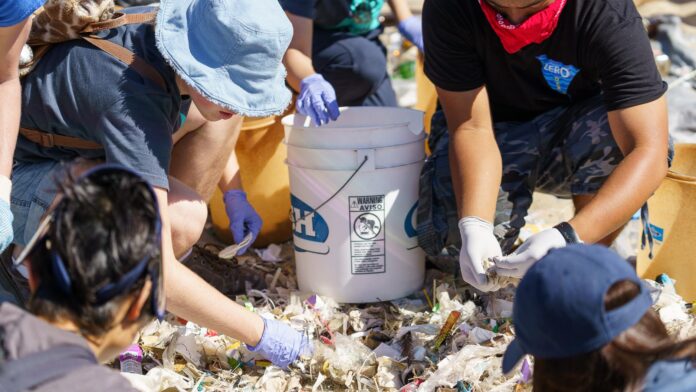Failing to vote on landmark plastic legislation, California must bring bills back next year, start a national conversation about plastic pollution
California’s 2019 Legislative Session reached its chaotic close on Friday, Sept. 13, and, unfortunately, two landmark plastic pollution reduction bills did not come to a floor vote. As we stare down the barrel of our self-inflicted plastic pollution and waste management crises, California must seize the opportunity to lead on this crucial environmental issue when the bills are brought back next year.
SB-54 (Allen) and AB-1080 (Gonzalez), together known as the California Circular Economy and Plastic Pollution Reduction Act, would create a framework that attacks the plastic pollution crisis from cradle to grave. The bills set two goals: ensuring that 75% of all single-use plastics and packaging are recyclable or compostable by 2030 and reducing 75% of waste generated from single-use plastic and packaging materials by 2020 through source reduction, recycling and composting.
These goals are ambitious, but they are the least California can do as the plastic crisis intensifies. These bills are California’s chance to set an example on major environmental legislation — as it has before — for other states and the federal government to follow. It’s disappointing not to hear the Democratic candidates talking more about plastic. It’s a complex issue that ties directly to climate change. Global plastic production is expected to triple by 2050 and account for 20% of global fossil fuel emissions. In other words, we need to talk about plastic on the national level, and we need to finally do something.
Since 1992, China imported a cumulative 92% of global plastic scraps. But China’s implementation of the National Sword policy bans imports of most recyclable plastic materials, displacing an estimated 111 million metric tons of plastic waste by 2030. While bill opponents think SB-54 and AB 1080 will cause economic harm, it’s important to note that local governments in California already spend about $420,000,000 annually in efforts to clean up and prevent plastic pollution. In addition, thousands of people are already losing their jobs as California’s recycling industry struggles. Now, much of the waste people think is recycled is just going to landfills, incinerators or our waterways.
Every year, our rivers convey about 4.8 to 12.7 million metric tons of plastic into the seas. It’s estimated that by 2050, the mass of plastic in the ocean will exceed that of fish. Much recent news coverage has been devoted to the unnerving trend of dead whales and dolphins washing ashore with their stomachs full of plastic. A recent study found plastic in the guts of 100% of turtles surveyed. Microplastics have also been found in shorebirds, fish that people eat and drinking water worldwide.
Most of these plastics do not biodegrade — they just break into smaller microplastics and stay in the water, accumulate in the tissues of humans and animals and cause numerous health problems. A new study from the University of Newcastle, Australia and the World Wildlife Fund estimates that the average person ingests approximately 250 grams of plastic annually, the equivalent of a credit card’s worth of plastic per week.
Over the summer, I had the unique opportunity to intern at Environment California as part of the environmental lobbying community trying to help pass these bills. While our efforts did not push the bills across the line, we must double down next year and prevent this from being all for naught.
After the close of the session, Senator Ben Allen (D-Santa Monica), the lead author of SB-54, expressed his disappointment over the failure to send the bills to Governor Newsom’s desk, but he remains optimistic.
“Going into the final week of session, following the last round of amendments, a significant number of previously-opposed industry groups came on in support, or went neutral,” Allen said. “This gave us momentum in advance of an Assembly vote, and I am confident that if taken up in time the measure would have passed both houses and been signed into law by the governor.”
Legislators must take full advantage of this extra time to improve the bills. But they must also be aware that if they continue to kick this (plastic) can down the road, they’ll only be creating a more difficult problem to solve, allowing for further damage to environmental and public health in the process.
Having also spent a summer absorbing the grandeur of the Pacific while studying oceanography and marine ecology at the UC Davis Bodega Marine Lab, I find this fight especially personal. It’s disheartening to think that the countless ecosystems there — the fish and aquatic birds they support, along with their counterparts across the globe — are permanently threatened by our inability to innovate our way out of a problem created by one of our most innovative products.
Written by: Benjamin Porter — bbporter@ucdavis.edu











